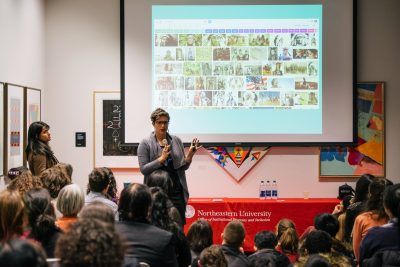
Northeastern University’s Office of Institutional Diversity and Inclusion hosted a lecture on Tuesday night as a part of its two-day event, “Cultural Appropriation, Indigenous Social Media & Racism.”
The small room at Northeastern Crossing was packed with a diverse and enthused crowd of students, faculty and locals.
Joanne Dunn, executive director of the North American Indian Center of Boston, began the lecture with a short traditional prayer.
“I love to go home, even though … I consider this our land,” Dunn said. “It isn’t just about me. It’s about all of us.”
Adrienne Keene, a Cherokee Nation descendant and a professor of American Studies at Brown University, presented a slideshow titled “Native Appropriations,” where she touched on many relevant examples of cultural appropriation in recent years.
Keene covered major issues of cultural appropriation in recent trends, from fake dream catchers and headdress fashions to the #NoDAPL movement.
She opened her lecture with a slide that featured a picture of a Google search for “Native American.”
“I really strongly believe that indigenous knowledge will save the world,” Keene said. “This is the space that we’re in.”
Keene mentioned the importance of activism and awareness of potential appropriation, and provided the audience with several ways to get involved.
“The internet has become a place where native people can really have platforms, have voices, can work together, across tribal lines, across community issues and come together to really make things happen,” Keene said. “It’s creating this shared language, it’s creating a network and it’s helping the non-native people to see the connections in all this.”
Keene said cultural appropriation results from colonial power structures.
“Cultural appropriation is the idea of taking from a culture that is not one’s own,” Keene said. “That on the surface is not, in itself, problematic. What is problematic is that that taking is never situated outside the power structures that exist.”
Keene said social media can promote portrayals of indigenous people as less human, thus delegitimizing them.
“In order to justify that dramatic loss of land and life, the indigenous people have to be painted as savage, as inferior, as less than human and unworthy of that land and unworthy of that life,” Keene said. “This delegitimization of indigenous claim to land is something that is extremely scary.”
Keene discussed indigenous presence at the Boston Women’s March for America, the potential for unintentional erasure and the importance of remaining a unified community throughout difficult times.
Keene closed her lecture by urging the audience to communicate with one another.
“In this time, it’s been really challenging to just have conversations with one another,” Keene said. “People often get caught up with not knowing the right language, not knowing the right words, but being able to just start the conversation somewhere is really important as we move forward.”
Several attendees said after the event that they appreciate Keene’s lecture.
“[Keene] clearly showed the economic impact of cultural appropriation, which I think is really important,” said Madina Agénor, 33, of Jamaica Plain. “We’re living in a moment where we all really need to be engaged and learn about different ways we can take action in an intersectional way. The only way that we can stand strong and stand together is by uniting and breaking down barriers, and working in intersectional ways.”
Jonathan Osborn, 30, of Jamaica Plain, is a doctoral student at Northeastern. He said he found Keene’s lecture and discussion fascinating.
“I do a lot of work on critical race theory, so cultural appropriation is really something I’m interested in,” Osborn said. “Seeing more specific moments for representation and thinking through the difficulty of humanizing and making the issue more apparent on a national scale were really enlightening.”
CORRECTION: Madina Agénor’s name was misspelled in a previous version.






















































































































